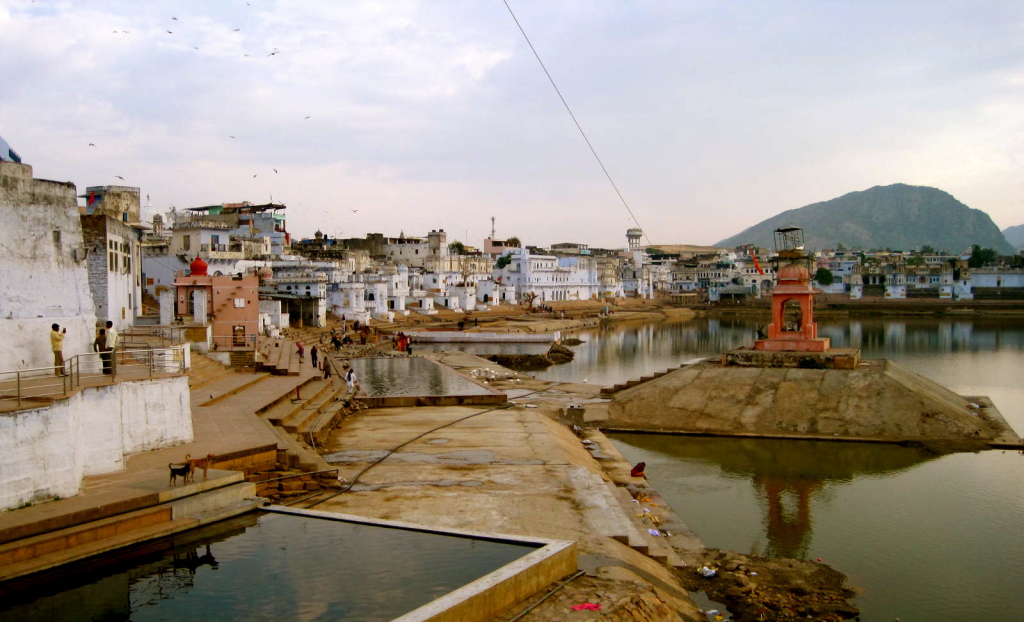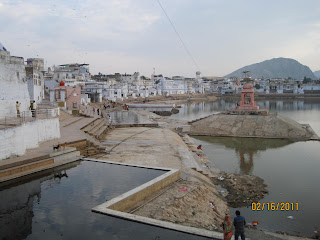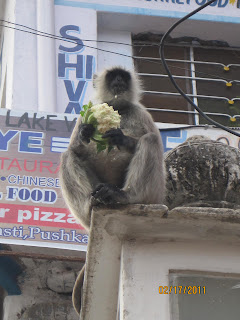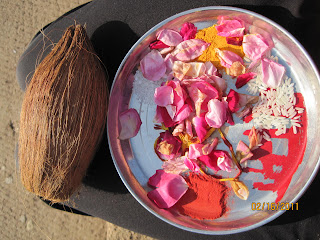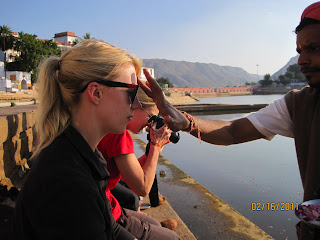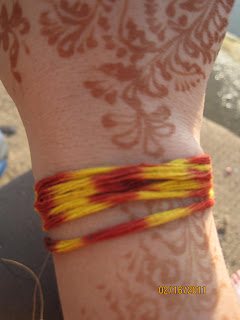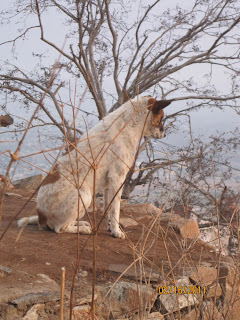Hindus contend that Lord Brahma (one of the three principle Hindu gods and Creator of the Universe) battled with a demon (Vajra Nabh), and killed him with a lotus blossom. During the fight, one of the petals from the lotus blossom fell to earth, creating a lake that is now the center of Pushkar (above). Many Hindus come to Pushkar to bathe in this lake (Lake Tirtharaj), believing that it will wash away their sins.
Monkeys abound in Pushkar. This one is eating cauliflower.
On day one, I took part in a Hindu ceremony at Lake Tirtharaj that involved these ingredients:
Each ingredient symbolizes something positive (e.g. good health, wealth).
Suffice it to say that, during the ceremony, a Hindu priest annoited us with the “red powder” (below).
After the red powder was applied to our foreheads, we threw the ingredients into Lake Tirtharaj. Afterwards, the priest tied a bracelet to our wrists (again, there is probably a technical term for said bracelet that I’m forgetting, sorry).
This bracelet is said to offer protection to all who wear it.
More of the little buggers.
The next morning, a Swiss girl named Tatjana and I decided to visit Savitri Temple for the sunrise. There’s an interesting story here. Savitri was Lord Brahma’s first wife. At some point in their marriage, he married a second woman, and Savitri was so upset that she moved away (to a hilltop overlooking Lake Tirtharaj, that is).
The temple of a scorned woman.
To reach this temple before sunrise, Tatjana and I first mountain biked through downtown Pushkar. The mountain bikes were heavy, sported one gear, and had a horn to boot. Needless to say, riding this contraption was not a cakewalk. After locking up our medieval torture devices at the base of the hill, we climbed hundreds of uneven steps to reach the temple.
It was an excellent workout. And the view was spectacular:
Pushkar before sunrise.
Pushkar at sunrise.
When I was watching the sunrise, a wild dog came up to me and stood next to me for a very long time and let me pet it. It stood so still and close.
I knew that it was a wild thing and that you can’t expect to contain a wild thing, so I had no expectation for it to sit or lay next to me. It nuzzled my armpit for a minute, then walked away. I had the strange sense at that moment that the dog embodied the spirit of someone I know, loved, and had died. This thought arose spontaneously, and I could not explain it….
Pushkar not only impressed me for religious and athletic reasons but also because of it’s hippy vibe.
Picture of ghats (stairs leading to the lake where religious ceremonies are performed). There are 52 sets of ghats surrounding Lake Tirtharaj.
No alcohol consumption is allowed in Pushkar, but something a little more naughty is going on in this holy city. It’s an open secret that many people are using bhang.
Bhang is a preparation from the leaves and flowers of the female cannabis plant. The code name for bhang is “special.” Interpretation: if you are dining at a restaurant in Pushkar and see something on the menu like “Special Lassi” or “Special Shake,” that food item has been laced with bhang.
Some kids dancing for me.
Lots of creative and spiritual thoughts infused my mind while I was visiting this little hippy mountain village. I experienced again that feeling of connectedness with other people. I thought about all the times in my life where I’d felt a bit of glee at someone else’s misfortune (e.g. listening to a friend recount her breakup story when I was sulky and single). And I realized how counterproductive that was, or is. When you see everyone as part of yourself, as a continuation of yourself then you would naturally want the best for them, because when other people are happy, it’s as though a part of you is, too.
I also remembered something I heard at a Buddhist meditation retreat. There are only two emotions: love and fear. Everything else is subcategorical. For instance, fear: guilt, prejudice, regret, anger. And love: joy, peace, forgiveness, acceptance.
Then, I remembered a science class from long ago, when my teacher explained to me that “cold” doesn’t exist. Cold is just an absence of heat. There in Pushkar a thought arose from nothingness, “Fear doesn’t exist. There really is only one emotion. Fear is just an absence of love.”
I feel a bit foolish transcribing these thoughts. I swear that no bhang was involved when I made my cold/heat and fear/love analogy. It’s just that Pushkar has a profoundly spiritual effect. I can’t explain it.
You need to visit.
